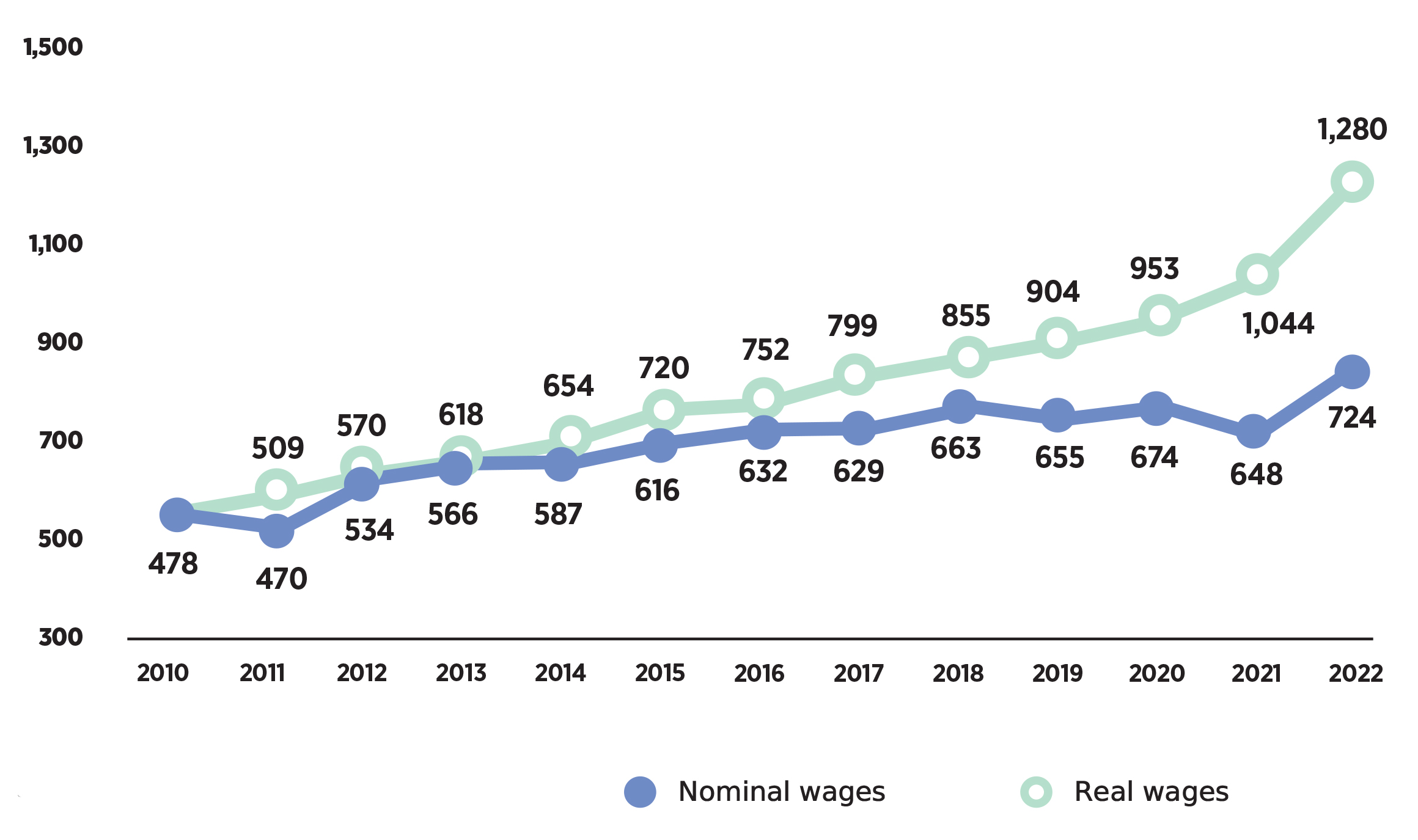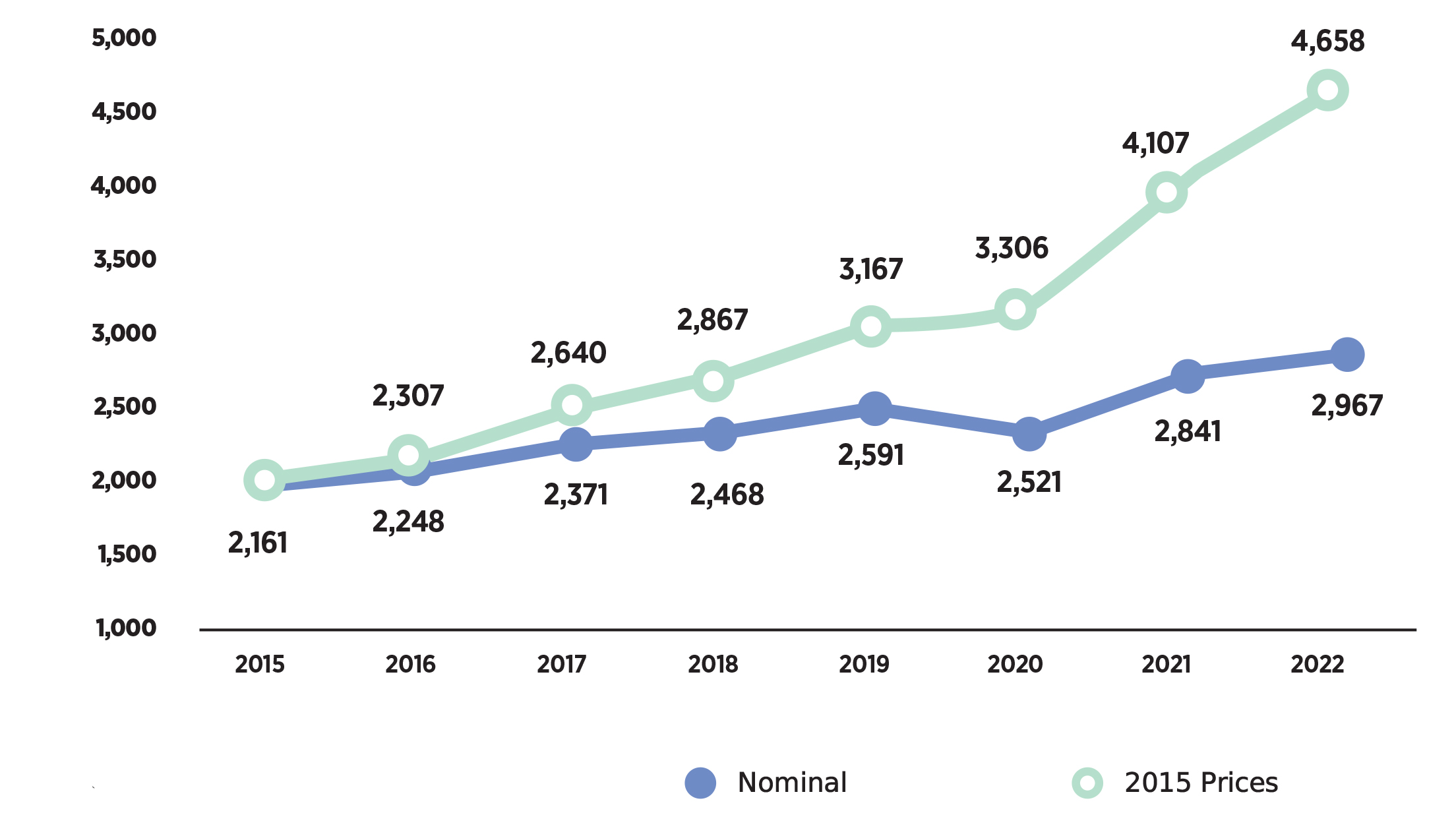The average monthly salary of employed personnel in Georgia is GEL 1,600. However, average disposable income after tax is GEL 1,280. For comparison, even in the lowest-income country of the European Union – Bulgaria, the average monthly salary is around USD 1,500, almost three times higher than the average salary in Georgia.
According to a study carried out by PMCG, there were 929,000 hired employees in Georgia in the fourth quarter of 2022, of whom only 23% had a monthly disposable income in excess of GEL 1,900, while 57% collected between GEL 500 and GEL 1,900, and 20% (approximately 182,000 citizens) had a salary of less than GEL 500.
Georgia is a low-income country, so it is logical that only a small part of the population has a high salary. There are no low-income countries where a significant portion of the workforce has high wages. It, therefore, begs the question: when will the majority of employees in Georgia have a high salary?
Average monthly salary after tax (GEL)

Except for 2020 (the year of the pandemic), the Georgian economy grew in each of the last 12 years, which should have led to an increase in salaries. Furthermore, we must consider the rate of inflation, which reduces the purchasing power of people’s salaries. Real wages are calculated by adjusting them for inflation. The well-being of employees can only increase through higher real wages that would allow them to buy more goods and services. For example, if an employee’s salary increases by 15% in a year while the inflation rate during the same period is 11%, this means that the salary has only gone up by 4% in real terms. We all remember the 1990s when people earned millions of coupons and could not even buy a loaf of bread.
Since 2010, the average monthly salary in Georgia has increased by 166% from GEL 598 to GEL 1,592. However, real wages adjusted for inflation increased by 51%, which is low for a twelve-month period. Nominal wages increased by an average of 9% per year, while real wages increased by 4.5%. This is due to high inflation. Real wages decreased in 2011, 2019 and 2021.
The public will only feel an increase in purchasing power and well-being if inflation is kept low and wage growth significantly exceeds any rise in prices.
There is no way for Georgia to achieve an increase in wages over the next couple of years to bring it anywhere close to even the lowest-income EU countries. However, it is possible to increase real wages each year significantly.
First, salaries are determined by labor productivity – the number of goods or services a person creates in a specific period. For example, if a person does not produce goods or services worth more than GEL 1,000 per month, they cannot have a salary of GEL 1,000 or more. This can be illustrated by the example of a self-employed person who does not have an employer and decides what price to set for their work.
In 2022, the monthly labor productivity per employee in Georgia was GEL 4,658, which is twice the figure for 2015. Still, in real terms (adjusted for price increases since 2015), labor productivity only increased by 37%. This is not a small amount, but the base effect has kept the wages modest, meaning that they were so low to begin with that a 37% increase has not resulted in high salaries.
Labor productivity in Georgia (GEL per month)

Labor productivity in Georgia varies significantly by employment sector. In 2022, the highest labor productivity (GEL 16,010 per month) was recorded in the IT sector, followed by finance (GEL 8,676). Labor productivity was lowest among the employees of the education sector (GEL 1,540) and agriculture (GEL 1,588). Thus, low-productivity industries are one of the main reasons for low wages in Georgia. Three hundred eighty thousand people are employed in the education and agricultural sectors. The average salary is around GEL 800 in the education sector and GEL 900 in agriculture. In comparison, average wages in the IT sector are around the GEL 3,000 mark.
Along with labor productivity, it is also essential to look at the share received by employees of the value of goods and services created by them. First, this depends on the share of labor in the prime cost of goods and services, which varies across sectors. An industry where the share of labor in the prime cost is high is called labor-intensive, while an industry where the value is mainly created by capital is called capital-intensive. Recently, technology-intensive industries where technology accounts for most of the value have become increasingly relevant.
Labor productivity in Georgia (GEL per month), 2022
Employment Sector | GEL |
| Information and communications | 16,010 |
| Financial activities | 8,676 |
| Arts, entertainment and leisure | 7,457 |
| Manufacturing | 5,423 |
| Vocational activities, science and technology | 4,819 |
| Hotels and restaurants | 4,646 |
| Transport and warehousing | 4,221 |
| Commerce and vehicle repairs | 4,129 |
| Construction | 3,849 |
| Public governance | 3,664 |
| Healthcare | 2,971 |
| Administrative and auxiliary services | 2,405 |
| Agriculture | 1,588 |
| Education | 1,540 |
Source: GeoStat
Along with the specifics of the industry, the share received by an employee is also determined by the current situation in the labor market. In countries with high unemployment, the employer can make more profit from hired labor, and vice versa – where there is low unemployment, the employer is forced to pay an employee as close as possible to the value created.
In 2021, the share of salaries in the Georgian economy was 54% (UNECE). Although the equivalent figure in Switzerland is 68%, Georgia’s 54% still compares favorably with the likes of Finland (54%), Israel (53%) and Poland (49%). However, the high share of wages in the Georgian economy results from inefficient employment rather than high salaries. Inefficient employment means that the use of labor-saving technologies is still relatively low. The best example of inefficient employment in Georgia is the agriculture sector, which employs 229,000 people (19% of all employed Georgians), but only accounts for 7% of the country’s economy.
For salaries to increase significantly in Georgia, three developments must occur simultaneously: labor productivity must increase, unemployment must fall, and high-paying jobs must be created.
Growth in labor productivity requires the following:
An increase in investment. There needs to be more capital investment per employee, and infrastructure should be improved.
Enhancing the education and qualifications of the workforce. The level of education, workforce qualifications and work culture need to be significantly increased across the country.
Technological progress. Technological developments allow an employee to do what few other people do today, to do it alone, and subsequently get paid more.
Unemployment reduction depends on a country’s economic growth. It is also worth noting that technological progress, which increases labor productivity, makes it difficult to create new jobs if a country does not create the technology itself. Therefore, much more economic growth is needed to create jobs today than in previous decades. A decrease in unemployment will reduce the employer’s cheap labor alternatives and force them to increase their staff’s wages as much as possible.
The creation of high-paying jobs depends on the workforce’s education level and qualifications. For example, a country may have high economic growth, but wages may not increase significantly because the change happens in industries that rely on cheap labor. This will lift the country out of extreme poverty but will not make it rich. A country’s population can never be affluent if it is mainly employed in the agriculture and service sectors where skill requirements are low. The Georgian education system needs reforms to raise the standard of education and the qualifications of the workforce.
If the level of education in Georgia cannot be increased and we fail to become a country providing modern in-demand services and technologies, most of the population will continue to have low wages. No country in the world can become rich without selling its natural resources if the level of education and the qualifications of its population are low. Georgia is no exception. It ranks 125th out of 141 countries in the World Economic Forum (WEF) workforce qualification index.
















